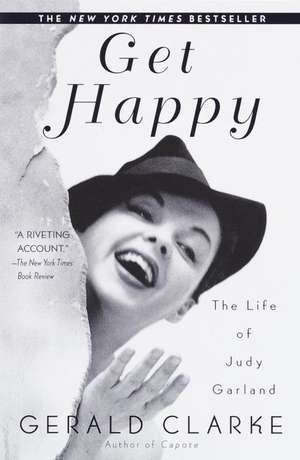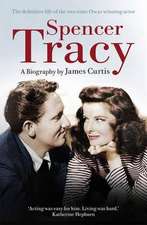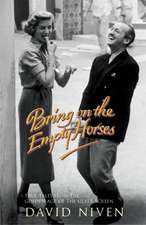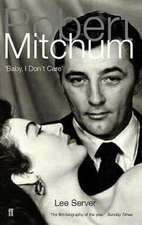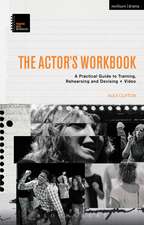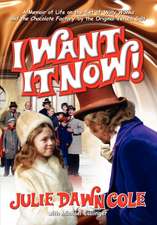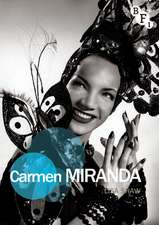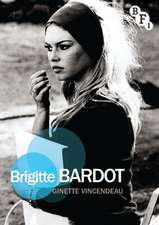Get Happy: The Life of Judy Garland
Autor Gerald Clarkeen Limba Engleză Paperback – 28 feb 2001
From her tumultuous early years as a child performer to her tragic last days, Gerald Clarke reveals the authentic Judy in a biography rich in new detail and unprecedented revelations. Based on hundreds of interviews and drawing on her own unfinished -- and unpublished -- autobiography, Get Happy presents the real Judy Garland in all her flawed glory.
With the same skill, style, and storytelling flair that made his bestselling Capote a landmark literary biography, Gerald Clarke sorts through the secrets and the scandals, the legends and the lies, to create a portrait of Judy Garland as candid as it is compassionate.
Here are her early years, during which her parents sowed the seeds of heartbreak and self-destruction that would plague her for decades ... the golden age of Hollywood, brought into sharp focus with cinematic urgency, from the hidden private lives of the movie world's biggest stars to the cold-eyed businessmen who controlled the machine ... and a parade of brilliant and gifted men -- lovers and artists, impresarios and crooks -- who helped her reach so many creative pinnacles yet left her hopeless and alone after each seemingly inevitable fall.
Here, then, is Judy Garland in all her magic and despair: the woman, the star, the legend, in a riveting saga of tragedy, resurrection, and genius.
| Toate formatele și edițiile | Preț | Express |
|---|---|---|
| Paperback (2) | 74.14 lei 3-5 săpt. | +38.87 lei 6-12 zile |
| Little Brown Book Group – 2 aug 2001 | 74.14 lei 3-5 săpt. | +38.87 lei 6-12 zile |
| DELTA – 28 feb 2001 | 127.46 lei 3-5 săpt. |
Preț: 127.46 lei
Nou
Puncte Express: 191
Preț estimativ în valută:
24.39€ • 26.08$ • 20.34£
24.39€ • 26.08$ • 20.34£
Carte disponibilă
Livrare economică 28 martie-11 aprilie
Preluare comenzi: 021 569.72.76
Specificații
ISBN-13: 9780385335157
ISBN-10: 0385335156
Pagini: 528
Dimensiuni: 156 x 234 x 35 mm
Greutate: 0.72 kg
Editura: DELTA
ISBN-10: 0385335156
Pagini: 528
Dimensiuni: 156 x 234 x 35 mm
Greutate: 0.72 kg
Editura: DELTA
Recenzii
"One of the most comprehensive biographies of entertainment icon Judy garland to date ... Clarke's skills as a storyteller make Garland's tale read like a heartbreaking novel."
-- US Weekly
"A compelling read ... in a big, gutsy biography,Gerald Clarke brings insight and fresh detail to Judy Garland's story."
-- Entertainment Weekly
"The last, best, and only essential account."
-- The Philadelphia Inquirer
-- US Weekly
"A compelling read ... in a big, gutsy biography,Gerald Clarke brings insight and fresh detail to Judy Garland's story."
-- Entertainment Weekly
"The last, best, and only essential account."
-- The Philadelphia Inquirer
Notă biografică
Gerald Clarke is the author of Capote, the much acclaimed, bestselling biography of Truman Capote. He has also written for many magazines, including Esquire, Architectural Digest, and Time, where for many years he was a senior writer. A native of Los Angeles and a graduate of Yale, he now lives in Bridgehampton, in eastern Long Island, New York.
Extras
Chapter 14
Liza -- Riding a Whirlwind
For every star that rises, another must fall. That was a law as old as Hollywood. Judy knew it -- it was, after all, the theme of A Star Is Born -- and so did everyone else. But how could she have guessed that she herself was destined to stumble? Or that, through a cruel and unsparing irony, her own spectacular decline would be matched, headline for headline, by the no less stunning ascent of her own daughter? For that was, indeed, what happened. "Liza's a Girl Riding a Whirlwind," declared one admiring paper, and while the folks on Rockingham Avenue were scrounging for dollars to buy chili, a fresh, slim Liza was pictured on the front page of the New York Daily News, cavorting on a Riviera beach as she prepared to wow an audience in Paris.
Liza had, in fact, been preparing to wow audiences all her life. Making her screen debut when she was only two and a half -- she appeared for a few seconds at the end of In the Good Old Summertime -- she had virtually grown up in M-G-M's magic factory, spending much of her time there even after Judy was fired. She sat in Vincente's lap as he rode his director's boom; she made friends with the actors and technicians; and she spent rapt hours in studio rehearsal halls, watching Fred Astaire, Gene Kelly and Cyd Charisse practice their routines. At home she had a more convenient model, and late at night Liza would sneak down the stairs to hear her mother sing at parties. Years later, one guest could still recall her intense dark eyes, not merely observing, but staring, studying and memorizing her mother's every gesture and movement.
Only seventeen when she appeared in a 1963 Off-Broadway revival of Best Foot Forward, Liza was on Broadway itself at nineteen, winning a Tony, the theater world's Academy Award, for her performance in another musical, Flora, the Red Menace. "Can you believe that's Liza up there?" Judy asked, in a happy daze of awe and wonder, at Flora's opening. Then to Donald Brooks, the show's innovative young costume designer, she excitedly whispered, "We did that! You got her up there looking the way she does. And I got her up there because I'm her mother and conceivably her inspiration -- the heck with her motivation." Separate careers in movies and nightclubs followed, and before she had even reached her majority, Liza was earning, according to one estimate, $400,000 a year.
Judy liked to brag that she had spared Liza the hardships she herself had suffered as a child. True enough, but she had burdened her firstborn with a different set of miseries, responsibilities so heavy that they would have crushed most adults. In a strange reversal of roles, Liza became almost a mother to her mother. She was the one who helped to manage the staff on Mapleton Drive. She was often the one who made sure that Joey and Lorna got off to school on time and that they were fed when they came home. "It was as though Liza had become the mom and Judy the child," said Mike Selsman, one of Judy's press agents. "It was sweet, kind of nice to watch, but a little disturbing to someone like me, who had come from an ordered background."
Liza's heaviest burden, however, was the maintenance of a permanent death watch: it was her duty, she believed, to protect her mother from herself, to ensure that she did not kill herself. The only girl in Los Angeles with her own stomach pump, Liza probably saved Judy's life on several occasions, climbing in her bathroom window when she suspected she had taken an overdose, and once even holding on to her feet when she was threatening to jump from a hotel window. In public, Liza tried to make light of such horrific chores. But the emotional cost was staggering. "It's just so terrible because I love her so much," she confessed in a shaky voice to one friend. "And I don't know what to do."
The child most like her, Judy called Liza, and the similarities were striking. Not only did they have the same unusual physique -- a big chest, a short waist and long legs -- but they shared the same likes and dislikes, even the same neuroses. Liza, too, was convinced she was ugly, a belief that was to make her, like her mother, eternally insecure.
Mother and daughter also responded to the same kind of man. It was Judy, in fact, who chose Liza's first husband. Peter Allen was a twenty-year-old Australian singer and dancer she saw performing during her stay in Hong Kong and subsequently invited to London. She needed a new opening act, she said, and he and his partner, Chris Bell -- the Allen Brothers, they called themselves -- would be it.
Matchmaking was what Judy really had in mind, however, and she was certain that Allen -- with his ginger hair, lopsided smile and infectious exuberance -- was the ideal mate for Liza. Allen himself seemed to agree. Sitting at a piano when Liza first walked into the room, he greeted her with the appropriate Gershwin tune -- "Isn't It a Pity? (We Never Met Before)." Liza apparently thought it was a pity as well. Joining him at the keyboard, she started singing, putting words to his music. From such harmony did love arise, and two and a half years later, on March 3, 1967, Judy's matchmaking was rewarded with a New York wedding.
At this point, the parallels between Liza's life and her mother's became, perhaps, too exact. Just as Judy had surprised Vincente with another man twenty years earlier, so now, barely three weeks into her marriage, did Liza come upon Allen in an equally compromising position. Thus it was that three generations -- grandmother, mother and daughter -- had found themselves in almost identical predicaments, their marriages blighted by their husbands' preference for men over women. Ethel with Frank. Judy with Vincente. And now Liza with Peter. As if under some mysterious curse, all three women were doomed, it seemed, to make the same mistake.
Lifting a peculiar situation into the realm of the bizarre was yet another unwelcome connection between mother and daughter. Unbeknownst to either of them, the men they were sleeping with -- Mark and Peter -- were also sleeping with each other. It was Mark who, wandering into the Hong Kong nightclub where the Allen Brothers were appearing, had first met Peter. And it was Peter's performance in bed, not on stage, that had excited him. He and Peter had made love in Hong Kong, they had made love again in London, and they had most likely continued to make love still later in the United States.
A huge betrayal, Liza was to call her dismaying discovery, though she, too, had had ample warning that the man of her dreams had romantic dreams of his own -- and that they did not necessarily feature her. Yet Liza's marriage survived for three more years, and for a very good reason. Not only did she love Peter, but she depended on his brash Aussie assurance -- he was her rock, she said -- to keep her mother at a safe distance. At twenty-one, an age when most people start to take on the responsibilities of adulthood, Liza did the reverse. She decided, for the first time in her life, to act like a child. She had, in short, stopped being a mother to her mother.
By 1967 Judy was on her own, as far as her older daughter was concerned; Liza became one of those people Judy often had trouble reaching on the telephone. Peter answered the phone in their Manhattan apartment, and if Judy was on the line, he would say that Liza was out. If Judy telephoned the building's front desk, the doorman would be more blunt. "Miss Minnelli is not accepting any calls from her mother," he would say. When Judy was able to get through, the conversations were not always pleasant, Liza even rejecting her mother's sobbing request for money to pay her utility bill. "She doesn't want to have anything to do with me," wailed Judy, hurt, resentful and, above all, uncomprehending.
After that, Judy could sometimes be heard making harsh and spiteful comments about her older daughter -- "ugly things," to use Alma's phrase. As Liza pushed her away, Judy devoted more of her praise to her second daughter. After hearing Lorna belt out her numbers in a school production of The Unsinkable Molly Brown, she turned to Doug Kelly and gleefully exclaimed: "Fuck Liza! This one's going to pay my rent!" Still, relations between Judy and Liza were never completely severed, and every chill was followed by a thaw. When Liza's first album was released, Judy was once again the proud mama. "Liza has a lot to learn," she concluded. "But she's doing well and she'll get better."
When she lost her house in the spring of 1967, Judy also lost the last semblance of normal existence. For the next two years she was little more than a vagabond, darting from town to town, hotel to hotel. With no one else to turn to, she had asked Sid to manage her career again, and in an effort to outwit the IRS, he had persuaded her to sign over her earnings to a corporation -- Group V, it was called -- owned by his friend Raymond Filiberti. Though Group V would pay Judy only $1,000 per concert, a figure that would rise to $1,500 after the first twenty-five, it would take care of all her expenses: hotel, food, clothing, everything. No longer would Joey and Lorna have to subsist on chili; Group V would buy the groceries.
Anybody but Sid would have been put off by Filiberti's mud-spattered credentials, which included a year in a federal jail for having transported stolen securities across state lines. But for the first several months, Filiberti nonetheless did what he had said he would do, renting Judy a Manhattan town house off Fifth Avenue, then a suite in the St. Moritz Hotel, across from Central Park. With Tom Green keeping a careful watch on her drugs, Judy also fulfilled her part of the bargain. She undertook a punishing round of concerts that included four triumphant weeks at the Palace, and she made an appearance on the Boston Common before her biggest live audience ever, 100,000 people, many of whom sat through two downpours merely for the pleasure of seeing her in person. "It was as if her voice had come out of the long years past," marveled the Boston Globe's critic. Presenting her with a souvenir of the city, a silver Paul Revere bowl, Boston's mayor, John F. Collins, was even warmer. "We have taken you to our hearts," he said. "God love you and bring you back to us."
But Judy's dealings with Group V grew increasingly chilly, becoming downright frosty in October, when she got into a screaming match with Filiberti's wife on a flight to London. Though Judy initiated the battle, suggesting that Mrs. Filiberti close her "flapping mouth," Sharon Filiberti, seventeen years younger and ten inches taller, gave perhaps better than she got, deriding Judy as an "old worn-out bag" and a "broken-down singer." Drinks, as well as words, were tossed, and by the time the plane landed in London, Judy was so upset that she turned right around and took the next flight back to New York.
Relations with Group V deteriorated still further in the weeks that followed. Judy missed three performances at Madison Square Garden's Felt Forum, and after breaking into her drug bag while Green was asleep, she made a disastrous appearance in Baltimore, wandering around the stage and muttering, just as she had done four years earlier in Melbourne. "Almost a classic tragedy" was how John Carlyle's father, who lived in Baltimore, characterized the "very sick" woman he saw that night. "Who's the son of a bitch behind all this?" he asked Carlyle.
That was, indeed, a question, and when Filiberti failed to pay her expenses at the St. Moritz in March 1968, Judy's arrangement with Group V all but collapsed. Unless her bill was paid immediately, Green was informed one morning, the doors to her suite would be locked and even Joey and Lorna, who had left for school, would not be allowed back in. Having spent everything he had on Judy and her children -- close to $60,000, by his calculation -- Green then remembered that Sid had raised cash in another emergency by pawning Judy's jewelry, which he later returned without her ever having known that it had been gone. With that example in mind, Green hocked two of her rings, then raced back to the St. Moritz with enough cash, a thousand dollars, to prevent her eviction.
This time Judy did notice that her rings were missing, however, and on Thursday night, April 11, she had Green arrested for grand larceny. Hauled off to the city jail in lower Manhattan, he was, as a reward for his good deeds, put in a cell with eleven others -- a car thief, a wife beater and numerous snoring drunks. Though Judy had previously announced that she would marry him in the chapel at Dartmouth College, she now dismissed him as nothing more than an employee. So much for their late-night vows aboard the Super Chief, so much for Christmas with his family, for midnight mass and making angels in the snow. So much, indeed, for the career Green had sacrificed on the altar of Judy Garland.
Once unleashed, paranoia finds betrayal everywhere, and before it had spent itself, Judy's rage took still another victim: a female fan, Nancy Barr, who, like Green, had also provided Judy with money, time and energy -- even, by Barr's account, a brief sexual relationship. Barr's sin? She had balled Green out of jail, an act that automatically put her on Judy's enemy list. During the days that followed Judy frightened her with so many hate-filled phone calls -- she would sic the Mafia on her, Judy screamed -- that Barr developed a nervous condition, a spastic colon. "I loved Judy," she said, "but I could not cope with her. I wore out." So said everybody who tried to help Judy hold her tattered life together.
Judy had survived so many crises and had made so many comebacks that it was hard for many to see that her situation had changed, that she had run out of options -- perhaps even out of time. One by one, those who loved her either left voluntarily or were forced to leave: Liza, Tom Green, Nancy Barr and, finally, Joey and Lorna. For years Judy had fought Sid for custody, afraid that he might take their children. Now she herself pushed them away, several times actually kicking them out of their rented quarters and forcing them to seek haven in Liza's apartment on East Fifty-seventh Street.
The first to flee was Joey. Probably not knowing who he was, his mother chased him around their apartment one wild night, then, as he leaped out the door and stumbled down the stairs, she hurled a butcher knife at him, aiming well enough that it brushed his hair. Barefoot and wearing nothing but a Pajama bottom, the terrified Joey ran three or four blocks through the dark and snowy streets of Manhattan until, at three o'clock in the morning, he reached the safety of his father's hotel.
Next to depart was Lorna, who, tough as she was, was not tough enough to withstand such ceaseless anxiety and so many sleepless nights. The result was three days in a hospital with what she called "a type of mental breakdown." That was followed, a few months later, by a panicked call to her father in Los Angeles. "Dad, I have to come live with you in California," she cried. "I have to come with you right now, today, tonight." A few hours later she was on a plane headed west.
New York, Boston, Los Angeles. Judy now went from one to another, so restless that she could not remain very long in one house or apartment, or even in one city. And all the while she was so broke, sometimes with as little as five dollars in her purse, that she had to plead for her meals and rooms. "I'm a great star," she had told Nancy Barr.
"Look what I've given to everybody. Where are all the fans? Where are they now that I need help?" A collapse during a performance at New Jersey's Garden State Arts Center in June sent her to Boston's Peter Bent Brigham Hospital, but she soon left to board another plane. The woman who had always traveled with mountains of luggage landed in Los Angeles with nothing more than a shopping bag stuffed with skirts, blouses and pills.
John Carlyle put her up for a few days, then passed her on to his friends Tucker Fleming and Charles Williamson, who had a larger, more secluded home in the Hollywood Hills. "This is the proper way of living," Judy said approvingly as she looked around her hosts' well-ordered house. She had flown so far mainly to see Joey, and Fleming and Williamson made sure she did, treating them to dinner at the Factory, a popular discotheque in West Hollywood. There, to the applause of the other dancers, mother and son did an old-fashioned fox-trot. When he grew up, Joey vowed, he would be a banker; then his mother would never again have to worry about money. "Did you hear what he said?" a tearful Judy asked her hosts. "What a wonderful son I have!"
A proper way of living did not suit Judy for very long. "It's just like the Christian Science Reading Room here," she soon complained to Fleming and Williamson, and returned to Boston, where she had rented a one-bedroom apartment in the new Prudential Center. Eager for a good night's sleep, her hosts were happy to wave farewell. "Judy made you feel you had run a two-minute mile," said Fleming. "We have met any number of people who have said, 'Ooooh, I wish I had known she needed help. I would have taken care of her.' Nonsense! Nobody could have done it."
New candidates always appeared, however, and several weeks later in New York, Judy met another young man, John Meyer, who was eager to try. Meyer's story was to resemble Tom Green's in everything but length, all the emotions Green had experienced in two and a half years being compressed into less than two months, from the middle of October to the middle of December. Within minutes of their introduction, Judy and Meyer, a piano player and songwriter, were talking like old friends. Within hours, Judy was living with him in his parents' apartment on Park Avenue. Within days, they were engaged to be married, and Meyer, like Green, had embarked on a holy crusade: the salvation of Judy Garland. "She can be greater than she's ever been, and I can help her do it," he told a dubious friend. "I can help her get back up there. "
The first job Meyer got her was not much of a step up: an engagement at Three, the gay and lesbian bar where he played the piano. Jackie Scott, one of the bar's owners, at first turned him down, appalled at the thought that a woman who had filled the Palladium, the Palace and the Hollywood Bowl was reduced to selling her songs in a two-room bar on East Seventy-second Street -- even if it was Scott's own bar. But when a friend pointed out the obvious, that Judy was desperate for money, Scott relented, and for two or three weekends Judy showed up around midnight, sang a couple of songs to adoring crowds, and walked out with a hundred dollars, her only income safe from the IRS. After that, Meyer aimed higher, arranging appearances on three national television shows and -- his crowning achievement -- five weeks at the Talk of the Town, London's premier supper club, at a salary of approximately $6,000 a week.
For Meyer, the exaltation of a relationship with Judy -- "she lived in four dimensions," he said -- soon gave way to exhaustion, and a man who had astonished people with his nervous energy was suddenly struggling to stay awake. Judy had worn him out, too. A case of the flu ended their affair. While Meyer was in bed, fighting off a fever, Judy discovered another savior in another piano player: Mickey Deans, the night manager of Arthur, a smart Manhattan discotheque in which she had spent many late hours. Now it was Mickey Deans who would accompany her to London. Now it was Mickey Deans -- DeVinko was his real last name -- whom she wanted to marry. "I finally got the right man to ask me," she said. "I've been waiting for a long time."
Liza -- Riding a Whirlwind
For every star that rises, another must fall. That was a law as old as Hollywood. Judy knew it -- it was, after all, the theme of A Star Is Born -- and so did everyone else. But how could she have guessed that she herself was destined to stumble? Or that, through a cruel and unsparing irony, her own spectacular decline would be matched, headline for headline, by the no less stunning ascent of her own daughter? For that was, indeed, what happened. "Liza's a Girl Riding a Whirlwind," declared one admiring paper, and while the folks on Rockingham Avenue were scrounging for dollars to buy chili, a fresh, slim Liza was pictured on the front page of the New York Daily News, cavorting on a Riviera beach as she prepared to wow an audience in Paris.
Liza had, in fact, been preparing to wow audiences all her life. Making her screen debut when she was only two and a half -- she appeared for a few seconds at the end of In the Good Old Summertime -- she had virtually grown up in M-G-M's magic factory, spending much of her time there even after Judy was fired. She sat in Vincente's lap as he rode his director's boom; she made friends with the actors and technicians; and she spent rapt hours in studio rehearsal halls, watching Fred Astaire, Gene Kelly and Cyd Charisse practice their routines. At home she had a more convenient model, and late at night Liza would sneak down the stairs to hear her mother sing at parties. Years later, one guest could still recall her intense dark eyes, not merely observing, but staring, studying and memorizing her mother's every gesture and movement.
Only seventeen when she appeared in a 1963 Off-Broadway revival of Best Foot Forward, Liza was on Broadway itself at nineteen, winning a Tony, the theater world's Academy Award, for her performance in another musical, Flora, the Red Menace. "Can you believe that's Liza up there?" Judy asked, in a happy daze of awe and wonder, at Flora's opening. Then to Donald Brooks, the show's innovative young costume designer, she excitedly whispered, "We did that! You got her up there looking the way she does. And I got her up there because I'm her mother and conceivably her inspiration -- the heck with her motivation." Separate careers in movies and nightclubs followed, and before she had even reached her majority, Liza was earning, according to one estimate, $400,000 a year.
Judy liked to brag that she had spared Liza the hardships she herself had suffered as a child. True enough, but she had burdened her firstborn with a different set of miseries, responsibilities so heavy that they would have crushed most adults. In a strange reversal of roles, Liza became almost a mother to her mother. She was the one who helped to manage the staff on Mapleton Drive. She was often the one who made sure that Joey and Lorna got off to school on time and that they were fed when they came home. "It was as though Liza had become the mom and Judy the child," said Mike Selsman, one of Judy's press agents. "It was sweet, kind of nice to watch, but a little disturbing to someone like me, who had come from an ordered background."
Liza's heaviest burden, however, was the maintenance of a permanent death watch: it was her duty, she believed, to protect her mother from herself, to ensure that she did not kill herself. The only girl in Los Angeles with her own stomach pump, Liza probably saved Judy's life on several occasions, climbing in her bathroom window when she suspected she had taken an overdose, and once even holding on to her feet when she was threatening to jump from a hotel window. In public, Liza tried to make light of such horrific chores. But the emotional cost was staggering. "It's just so terrible because I love her so much," she confessed in a shaky voice to one friend. "And I don't know what to do."
The child most like her, Judy called Liza, and the similarities were striking. Not only did they have the same unusual physique -- a big chest, a short waist and long legs -- but they shared the same likes and dislikes, even the same neuroses. Liza, too, was convinced she was ugly, a belief that was to make her, like her mother, eternally insecure.
Mother and daughter also responded to the same kind of man. It was Judy, in fact, who chose Liza's first husband. Peter Allen was a twenty-year-old Australian singer and dancer she saw performing during her stay in Hong Kong and subsequently invited to London. She needed a new opening act, she said, and he and his partner, Chris Bell -- the Allen Brothers, they called themselves -- would be it.
Matchmaking was what Judy really had in mind, however, and she was certain that Allen -- with his ginger hair, lopsided smile and infectious exuberance -- was the ideal mate for Liza. Allen himself seemed to agree. Sitting at a piano when Liza first walked into the room, he greeted her with the appropriate Gershwin tune -- "Isn't It a Pity? (We Never Met Before)." Liza apparently thought it was a pity as well. Joining him at the keyboard, she started singing, putting words to his music. From such harmony did love arise, and two and a half years later, on March 3, 1967, Judy's matchmaking was rewarded with a New York wedding.
At this point, the parallels between Liza's life and her mother's became, perhaps, too exact. Just as Judy had surprised Vincente with another man twenty years earlier, so now, barely three weeks into her marriage, did Liza come upon Allen in an equally compromising position. Thus it was that three generations -- grandmother, mother and daughter -- had found themselves in almost identical predicaments, their marriages blighted by their husbands' preference for men over women. Ethel with Frank. Judy with Vincente. And now Liza with Peter. As if under some mysterious curse, all three women were doomed, it seemed, to make the same mistake.
Lifting a peculiar situation into the realm of the bizarre was yet another unwelcome connection between mother and daughter. Unbeknownst to either of them, the men they were sleeping with -- Mark and Peter -- were also sleeping with each other. It was Mark who, wandering into the Hong Kong nightclub where the Allen Brothers were appearing, had first met Peter. And it was Peter's performance in bed, not on stage, that had excited him. He and Peter had made love in Hong Kong, they had made love again in London, and they had most likely continued to make love still later in the United States.
A huge betrayal, Liza was to call her dismaying discovery, though she, too, had had ample warning that the man of her dreams had romantic dreams of his own -- and that they did not necessarily feature her. Yet Liza's marriage survived for three more years, and for a very good reason. Not only did she love Peter, but she depended on his brash Aussie assurance -- he was her rock, she said -- to keep her mother at a safe distance. At twenty-one, an age when most people start to take on the responsibilities of adulthood, Liza did the reverse. She decided, for the first time in her life, to act like a child. She had, in short, stopped being a mother to her mother.
By 1967 Judy was on her own, as far as her older daughter was concerned; Liza became one of those people Judy often had trouble reaching on the telephone. Peter answered the phone in their Manhattan apartment, and if Judy was on the line, he would say that Liza was out. If Judy telephoned the building's front desk, the doorman would be more blunt. "Miss Minnelli is not accepting any calls from her mother," he would say. When Judy was able to get through, the conversations were not always pleasant, Liza even rejecting her mother's sobbing request for money to pay her utility bill. "She doesn't want to have anything to do with me," wailed Judy, hurt, resentful and, above all, uncomprehending.
After that, Judy could sometimes be heard making harsh and spiteful comments about her older daughter -- "ugly things," to use Alma's phrase. As Liza pushed her away, Judy devoted more of her praise to her second daughter. After hearing Lorna belt out her numbers in a school production of The Unsinkable Molly Brown, she turned to Doug Kelly and gleefully exclaimed: "Fuck Liza! This one's going to pay my rent!" Still, relations between Judy and Liza were never completely severed, and every chill was followed by a thaw. When Liza's first album was released, Judy was once again the proud mama. "Liza has a lot to learn," she concluded. "But she's doing well and she'll get better."
When she lost her house in the spring of 1967, Judy also lost the last semblance of normal existence. For the next two years she was little more than a vagabond, darting from town to town, hotel to hotel. With no one else to turn to, she had asked Sid to manage her career again, and in an effort to outwit the IRS, he had persuaded her to sign over her earnings to a corporation -- Group V, it was called -- owned by his friend Raymond Filiberti. Though Group V would pay Judy only $1,000 per concert, a figure that would rise to $1,500 after the first twenty-five, it would take care of all her expenses: hotel, food, clothing, everything. No longer would Joey and Lorna have to subsist on chili; Group V would buy the groceries.
Anybody but Sid would have been put off by Filiberti's mud-spattered credentials, which included a year in a federal jail for having transported stolen securities across state lines. But for the first several months, Filiberti nonetheless did what he had said he would do, renting Judy a Manhattan town house off Fifth Avenue, then a suite in the St. Moritz Hotel, across from Central Park. With Tom Green keeping a careful watch on her drugs, Judy also fulfilled her part of the bargain. She undertook a punishing round of concerts that included four triumphant weeks at the Palace, and she made an appearance on the Boston Common before her biggest live audience ever, 100,000 people, many of whom sat through two downpours merely for the pleasure of seeing her in person. "It was as if her voice had come out of the long years past," marveled the Boston Globe's critic. Presenting her with a souvenir of the city, a silver Paul Revere bowl, Boston's mayor, John F. Collins, was even warmer. "We have taken you to our hearts," he said. "God love you and bring you back to us."
But Judy's dealings with Group V grew increasingly chilly, becoming downright frosty in October, when she got into a screaming match with Filiberti's wife on a flight to London. Though Judy initiated the battle, suggesting that Mrs. Filiberti close her "flapping mouth," Sharon Filiberti, seventeen years younger and ten inches taller, gave perhaps better than she got, deriding Judy as an "old worn-out bag" and a "broken-down singer." Drinks, as well as words, were tossed, and by the time the plane landed in London, Judy was so upset that she turned right around and took the next flight back to New York.
Relations with Group V deteriorated still further in the weeks that followed. Judy missed three performances at Madison Square Garden's Felt Forum, and after breaking into her drug bag while Green was asleep, she made a disastrous appearance in Baltimore, wandering around the stage and muttering, just as she had done four years earlier in Melbourne. "Almost a classic tragedy" was how John Carlyle's father, who lived in Baltimore, characterized the "very sick" woman he saw that night. "Who's the son of a bitch behind all this?" he asked Carlyle.
That was, indeed, a question, and when Filiberti failed to pay her expenses at the St. Moritz in March 1968, Judy's arrangement with Group V all but collapsed. Unless her bill was paid immediately, Green was informed one morning, the doors to her suite would be locked and even Joey and Lorna, who had left for school, would not be allowed back in. Having spent everything he had on Judy and her children -- close to $60,000, by his calculation -- Green then remembered that Sid had raised cash in another emergency by pawning Judy's jewelry, which he later returned without her ever having known that it had been gone. With that example in mind, Green hocked two of her rings, then raced back to the St. Moritz with enough cash, a thousand dollars, to prevent her eviction.
This time Judy did notice that her rings were missing, however, and on Thursday night, April 11, she had Green arrested for grand larceny. Hauled off to the city jail in lower Manhattan, he was, as a reward for his good deeds, put in a cell with eleven others -- a car thief, a wife beater and numerous snoring drunks. Though Judy had previously announced that she would marry him in the chapel at Dartmouth College, she now dismissed him as nothing more than an employee. So much for their late-night vows aboard the Super Chief, so much for Christmas with his family, for midnight mass and making angels in the snow. So much, indeed, for the career Green had sacrificed on the altar of Judy Garland.
Once unleashed, paranoia finds betrayal everywhere, and before it had spent itself, Judy's rage took still another victim: a female fan, Nancy Barr, who, like Green, had also provided Judy with money, time and energy -- even, by Barr's account, a brief sexual relationship. Barr's sin? She had balled Green out of jail, an act that automatically put her on Judy's enemy list. During the days that followed Judy frightened her with so many hate-filled phone calls -- she would sic the Mafia on her, Judy screamed -- that Barr developed a nervous condition, a spastic colon. "I loved Judy," she said, "but I could not cope with her. I wore out." So said everybody who tried to help Judy hold her tattered life together.
Judy had survived so many crises and had made so many comebacks that it was hard for many to see that her situation had changed, that she had run out of options -- perhaps even out of time. One by one, those who loved her either left voluntarily or were forced to leave: Liza, Tom Green, Nancy Barr and, finally, Joey and Lorna. For years Judy had fought Sid for custody, afraid that he might take their children. Now she herself pushed them away, several times actually kicking them out of their rented quarters and forcing them to seek haven in Liza's apartment on East Fifty-seventh Street.
The first to flee was Joey. Probably not knowing who he was, his mother chased him around their apartment one wild night, then, as he leaped out the door and stumbled down the stairs, she hurled a butcher knife at him, aiming well enough that it brushed his hair. Barefoot and wearing nothing but a Pajama bottom, the terrified Joey ran three or four blocks through the dark and snowy streets of Manhattan until, at three o'clock in the morning, he reached the safety of his father's hotel.
Next to depart was Lorna, who, tough as she was, was not tough enough to withstand such ceaseless anxiety and so many sleepless nights. The result was three days in a hospital with what she called "a type of mental breakdown." That was followed, a few months later, by a panicked call to her father in Los Angeles. "Dad, I have to come live with you in California," she cried. "I have to come with you right now, today, tonight." A few hours later she was on a plane headed west.
New York, Boston, Los Angeles. Judy now went from one to another, so restless that she could not remain very long in one house or apartment, or even in one city. And all the while she was so broke, sometimes with as little as five dollars in her purse, that she had to plead for her meals and rooms. "I'm a great star," she had told Nancy Barr.
"Look what I've given to everybody. Where are all the fans? Where are they now that I need help?" A collapse during a performance at New Jersey's Garden State Arts Center in June sent her to Boston's Peter Bent Brigham Hospital, but she soon left to board another plane. The woman who had always traveled with mountains of luggage landed in Los Angeles with nothing more than a shopping bag stuffed with skirts, blouses and pills.
John Carlyle put her up for a few days, then passed her on to his friends Tucker Fleming and Charles Williamson, who had a larger, more secluded home in the Hollywood Hills. "This is the proper way of living," Judy said approvingly as she looked around her hosts' well-ordered house. She had flown so far mainly to see Joey, and Fleming and Williamson made sure she did, treating them to dinner at the Factory, a popular discotheque in West Hollywood. There, to the applause of the other dancers, mother and son did an old-fashioned fox-trot. When he grew up, Joey vowed, he would be a banker; then his mother would never again have to worry about money. "Did you hear what he said?" a tearful Judy asked her hosts. "What a wonderful son I have!"
A proper way of living did not suit Judy for very long. "It's just like the Christian Science Reading Room here," she soon complained to Fleming and Williamson, and returned to Boston, where she had rented a one-bedroom apartment in the new Prudential Center. Eager for a good night's sleep, her hosts were happy to wave farewell. "Judy made you feel you had run a two-minute mile," said Fleming. "We have met any number of people who have said, 'Ooooh, I wish I had known she needed help. I would have taken care of her.' Nonsense! Nobody could have done it."
New candidates always appeared, however, and several weeks later in New York, Judy met another young man, John Meyer, who was eager to try. Meyer's story was to resemble Tom Green's in everything but length, all the emotions Green had experienced in two and a half years being compressed into less than two months, from the middle of October to the middle of December. Within minutes of their introduction, Judy and Meyer, a piano player and songwriter, were talking like old friends. Within hours, Judy was living with him in his parents' apartment on Park Avenue. Within days, they were engaged to be married, and Meyer, like Green, had embarked on a holy crusade: the salvation of Judy Garland. "She can be greater than she's ever been, and I can help her do it," he told a dubious friend. "I can help her get back up there. "
The first job Meyer got her was not much of a step up: an engagement at Three, the gay and lesbian bar where he played the piano. Jackie Scott, one of the bar's owners, at first turned him down, appalled at the thought that a woman who had filled the Palladium, the Palace and the Hollywood Bowl was reduced to selling her songs in a two-room bar on East Seventy-second Street -- even if it was Scott's own bar. But when a friend pointed out the obvious, that Judy was desperate for money, Scott relented, and for two or three weekends Judy showed up around midnight, sang a couple of songs to adoring crowds, and walked out with a hundred dollars, her only income safe from the IRS. After that, Meyer aimed higher, arranging appearances on three national television shows and -- his crowning achievement -- five weeks at the Talk of the Town, London's premier supper club, at a salary of approximately $6,000 a week.
For Meyer, the exaltation of a relationship with Judy -- "she lived in four dimensions," he said -- soon gave way to exhaustion, and a man who had astonished people with his nervous energy was suddenly struggling to stay awake. Judy had worn him out, too. A case of the flu ended their affair. While Meyer was in bed, fighting off a fever, Judy discovered another savior in another piano player: Mickey Deans, the night manager of Arthur, a smart Manhattan discotheque in which she had spent many late hours. Now it was Mickey Deans who would accompany her to London. Now it was Mickey Deans -- DeVinko was his real last name -- whom she wanted to marry. "I finally got the right man to ask me," she said. "I've been waiting for a long time."
Descriere
An entertainer of magical power, Judy Garland was also the woman of a hundred heartbreaks. Clarke recreates Garland's Hollywood, bringing to life the leading roles in her story: Louis B. Mayer, Lana Turner, Orson Welles, and Vincente Minnelli. With access to taped recordings--and her unfinished manuscript--Clarke is able to tell Garland's story as no one else has. Photos.
